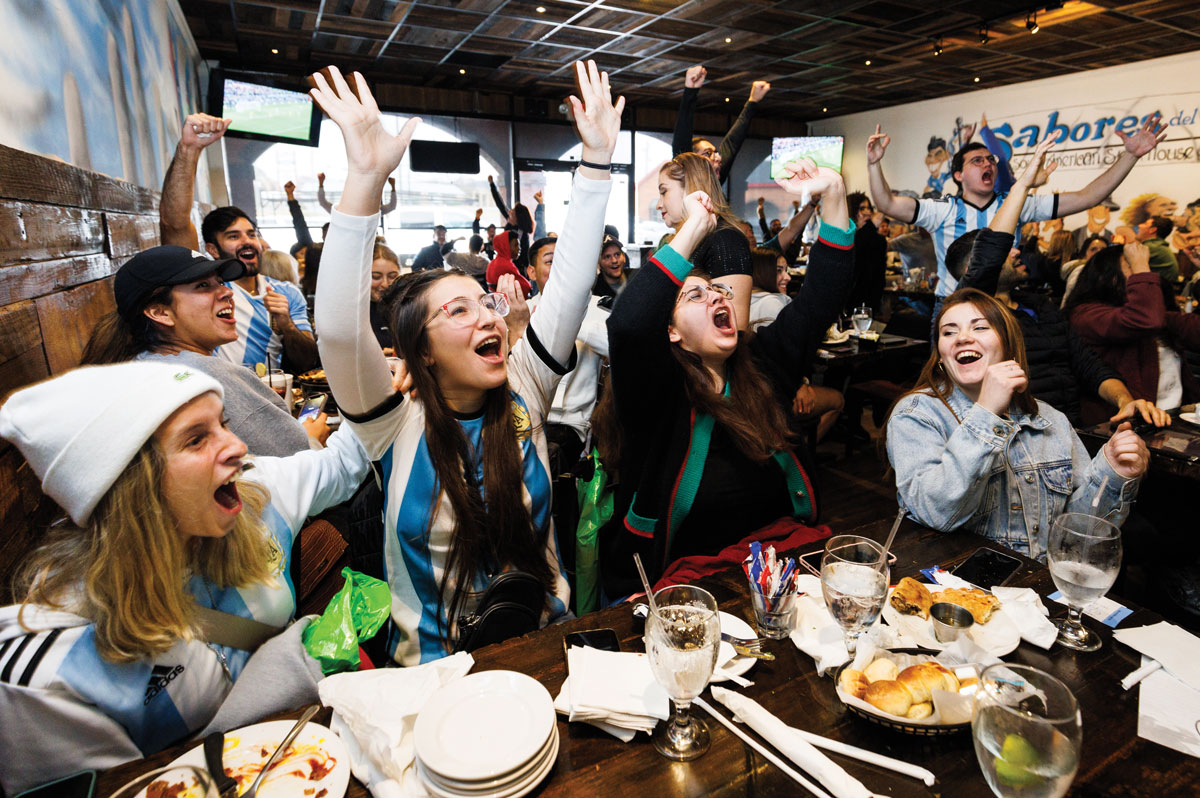
Photograph by Dustin Chambers
Eat, Pray, Broadcast
By Sam Worley
The Church Ladies don’t just play church ladies on TV—they’re church ladies in real life too. For instance, Renice Beavers—she goes by Nicey—is the cochair of the hospitality ministry at her place of worship, which is where one of the church mothers told her, in 2019, about auditions for The Church Ladies Cooking Show. “In our church, when one of the mothers requests that you do something, just out of respect you do it,” she said. “I really didn’t know what to expect.” None of the Church Ladies have formal culinary training, and none are professional actors—a key ingredient in the organic charm of the Atlanta-based show, which releases its new season in February.
It’s the brainchild of Tony Rankins, a longtime video producer who had the idea a few years ago while watching a cooking show with his wife, Carmelia. “My background is of the old African American AME Church, where, after we got out of church, we would go downstairs and eat dinner,” Rankins said. “We’d have collard greens, we’d have cornbread, we’d have fried chicken on little paper plates.” That inspired the concept he developed—“that old-fashioned dinner after church where the ladies would fix the meal and they would say, like, Whatchu want, baby? How you doin’, baby?” He spread the word that he was looking for stars.
Not long ago, the four Church Ladies gathered on Zoom to discuss the show. It was a Thursday evening—they have day jobs. Retired from the DeKalb County Sheriff’s Office, Nicey Beavers now works in nursing. Cryshenda Riley, aka Chef Khrys, manages a kitchen in Alpharetta, while Sharon Simms works in the kitchen at her megachurch, serving 3,000 people. Libby Gladstone, the newest member, is a registered life insurance agent but works selling “really high-priced gourmet cheese” at a local supermarket. “I go from one bit of food to the next!” she said.
In roughly half-hour episodes, mostly filmed in Rankins’s kitchen—and available on YouTube, as well as various streaming services—the Ladies dispense cooking and life advice. They make stuffed crab shells, chicken casserole, meat loaf, and Super Bowl snacks; they take requests; they go on location to places like Tassili’s Raw Reality. They joke about the church singles ministry. They offer various tips for worship, like how eating a meal lighter than the usual fried chicken will help you stay awake through the second service at church.
An alternative, as suggested in an early episode: What about blackened salmon over spaghetti squash? Riley handles the fish: “We’re gonna take a little oil and we’re gonna rub it down,” she says.
Beavers: “Okay, just lay your hands on it.”
Riley: “And we’re gonna put our blackening seasoning—”
Beavers: “In the name of the father, the son . . .”
“We cook a lot of things like back in the old-school church, but we’ve modernized a great deal of the foods we were raised on,” Beavers said on Zoom. Some of their recipes are vegan, low-sugar, or keto-friendly. Riley mentioned that she’d become taken with the protein-rich wheat gluten product seitan: “But I don’t like to call it say-tan,” she said, smiling. “I call it see-tan.” Jesus, take the wheat.
Simms, who also has a catering business, said her cooking is inseparable from her faith. She went to school to be a psychologist but “God had something else for me,” she said. She felt called to minister but “never fit the platform of a minister.” She first started helping out in the kitchen at her church after she got saved. “That helped turn me into a better, quote-unquote, church lady,” she said. “If you can’t preach to people, you can always preach through their food. You can always pray over their food. When they eat your food, they eating me. They eating a part of me. They eating that Word just as well as they eat anything else. And I’m like, Okay, Lord. I didn’t understand that concept—but God really ministered to me through cooking.”

Photograph by Dustin Chambers
The Milanesa Grows Cold
By Timothy Pratt
Andrés Merro ordered the milanesa napolitana with apparent interest.
The dish is Argentine, like Merro. Its name reflects the Italian roots claimed by up to 60 percent of his compatriots, owing to a massive period of immigration during six decades starting in the mid-19th century. But on this Sunday during the World Cup, the milanesa—a Buenos Aires staple transplanted to the Sabores del Plata restaurant in Gwinnett County—sits untouched.
Argentines “take their football very seriously,” Mexican journalist Carlos Puig noted in a podcast released during the tournament. “They observe, analyze, say something once in a while—but above all, they don’t take their eyes off the screen.” Today Argentina is playing Mexico, and there are about 80 fans gathered here to watch, some of whom found the restaurant in a Facebook group dedicated to Argentines in Atlanta. Most belong to the state’s expanding Hispanic community, which accounted for just over a quarter of Georgia’s population growth from 2010 to 2020.
Ranked third in the world by FIFA, the international body that oversees global soccer, the South American men’s team has already lost its first game to Saudi Arabia, 2–1, a historic upset. They have to win this one. Eleven minutes in, Merro is screaming at the screen: “Pass it to the middle!” By the 19th minute, he’s complaining about the refereeing. “More anxiety than excitement,” a friend texts me after I send him a video of the room.
Forty minutes in, Merro’s talking to himself. His wife and two daughters seem unbothered. The milanesa—a breaded cut of steak or other meat, similar to its Italian namesake, topped with ham, marinara, and mozzarella—has long gone cold. He’s biting his nails. The game, a scrappy, tactical affair, is still 0–0.
At halftime, Paula Tomaselli says she drove from Smyrna to see the match. It’s her third World Cup at the restaurant. At 31, she’s lived half her life in the U.S. Most of the time, she says, “I’m not connected with being Argentinian,” but today she’s been messaging with friends in Buenos Aires on WhatsApp. The World Cup, these hours in a Norcross restaurant, give her a reason: “Football makes it easy.” Others in the restaurant are also on the phone with family in Argentina.
By the 57th minute, a half-hour-plus remaining, a waitress asks Merro if she should take his plate. He waves at the air. She turns away. Three minutes later, his wife asks for a to-go container. Several more and Lionel Messi—the Argentine player considered by many to be among the game’s best ever—has scored. Merro writhes in ecstasy, doubles over, fists clenched. People are standing on tables, waving jerseys in the air.
The game finishes 2–0. (In a couple weeks, Messi will lead the Argentine team to its first World Cup championship in almost 30 years. WhatsApp calls between the U.S. and Buenos Aires will multiply exponentially.) Near the front door, Alex Vallejos is finishing a bottle of malbec. He reserved a table three months in advance, visiting Atlanta from Lake Arrowhead, California. He has brought his wife’s family, who are among the few non-Argentines present. They’re waiting outside. “I have no choice but to come here,” he said. “It’s in my blood!”
Then he points to his eight-month-old son, Valentino, outside in his wife’s arms. “He has no choice either!”
“Sometimes I’m Here Just for the Vibes”
By Hallie Lieberman
Clad in white thigh-high boots and a transparent dress, Sierra twerks onstage in the wee hours of a Friday morning as customers tuck dollar bills into her thong. Sierra is one of dozens of dancers who sparkle and shimmy at Hush Night, a strip show featuring all transgender women, hosted two nights a week by the Cheshire Bridge Road club Tokyo Valentino. Inside the three-story, grotto-like club, men and women mill around, sipping drinks and bopping to the DJ’s mix of pop and R&B. When they aren’t dancing, performers retire to another room adorned with mirrored walls and diner-style booths, where they flirt with customers in hopes of convincing them to buy lap dances.
Up to 200 customers pay the $27 entry fee to see each show. Dancers can make thousands in tips a night, but many have other jobs and aspirations. Sierra, who supports herself solely through Hush Night, says she hopes to open a trans strip club or salon. Portia, who otherwise works as a driver, also wants to open a salon. Arya is a traveling nurse who doesn’t need the money from dancing, but works Hush Night in part because it’s a safe place. “Sometimes I’m here just for the vibes,” Arya said. Portia thinks the success of Hush Night is easy to explain. “What man doesn’t like a beautiful, half-naked woman with glitter?” she said.
Six years ago, Hush Night proprietor Lenox Love was at a strip club when he wondered: “Why don’t they have trans women?” Love was romantically interested in trans women, but the only surefire ways he knew to meet them were at gay clubs and “on the stroll,” selling sex. The former Marine (Lenox Love is his stage name) was working security at the Marquette when he asked the owner if he could start an all-trans strip show. The owner was game, but there was a problem: Love didn’t have any dancers lined up. With the help of Craigslist, he called every trans dancer he could find, and all declined. Finally one said yes: adult actress Toya da Body. After she joined, dozens followed.
Love tried out the show at a couple different clubs but faced online death threats and unenthused clubgoers. After the second club canceled Hush Night, he asked Tokyo Valentino—which said yes. Hush Night is now one of the few all-trans strip shows in the country.
Portia has danced for Hush Night since the beginning. “If you’re trans-attracted [in Atlanta], you know about Hush Night,” she said. Customers, in addition to performers, appreciate the judgment-free space. Yet stigma remains. “I’ve had guys who’ve pulled up to Tokyo Valentino three weeks in a row before they got courage to walk inside the building,” Love said.
Behind the success has been tragedy. One dancer was shot during a robbery; Toya da Body and another dancer both died unexpectedly in 2021. Love contemplated closing Hush Night but decided against it. “Why I was doing it in the beginning was to admire trans women, but also to make money,” he said. “But now it became so much bigger than that reason. Now, it’s like they find a home there, they find comfort there.”
These articles appear in our February 2023 issue.










![The North Carolina Museum of Natural Sciences’ newest exhibit is a [pre]historic first](https://cdn2.atlantamagazine.com/wp-content/uploads/sites/4/2024/04/DD-3-100x70.jpg)


